Hướng Dẫn A-Z, Kiến Thức Wordpress
How to Add and Use Widgets in WordPress (Step by Step)
Do you want to learn how to add and use widgets in WordPress?
Widgets allow you to add different functionality to your WordPress sidebars and other widget-ready areas, all without writing any code.
In this article, we will show you how to add and use widgets in WordPress so that you can quickly customize your site.

What Are Widgets & Why Do You Need Them in WordPress?
Widgets are blocks of content that you can add to your WordPress sidebars, footer, and other widget areas of your website.
This can be an easy way to add image galleries, social media feeds, quotes, calendars, popular posts, and other dynamic elements to your WordPress website.
You can find your widget area by going to Appearance » Widgets in your WordPress admin dashboard.
Here, you will see a list of your available widget areas. In the example below using the Astra theme, there are multiple areas where you can add widgets, including the sidebar, header, and footer.

The areas where you can place widgets are defined by your WordPress theme, so it could look different depending on the theme you are using.
With that said, let’s show you how to easily add widgets to different areas of your WordPress website.
How to Add a Widget to a Sidebar in WordPress
There are multiple ways you can add widgets to your WordPress sidebar area.
The easiest way is to navigate to Appearance » Widgets and then click the upward arrow in the sidebar widget section to expand the widget section.
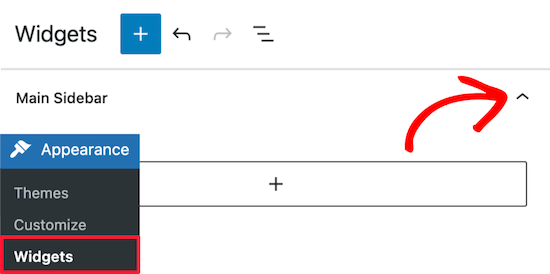
Then, click the ‘+’ icon to bring up the widget block menu.
Here, you can search for a widget by name. Or, click the ‘Browse all’ button to bring up a menu of all the available widgets.
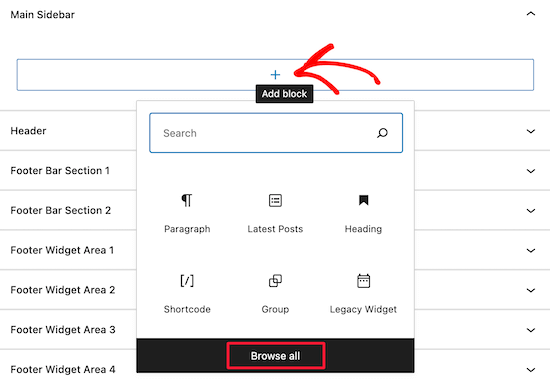
To add a widget to your sidebar, simply click on that widget, and it will automatically be added to your sidebar.
Then, all you have to do is click the ‘Update’ button, and the widget will now be live on your website.

The widgets page isn’t the only way to add widgets to your WordPress blog.
You can also add widgets by using the WordPress theme customizer. First, navigate to Appearance » Customize and then click the ‘Widgets’ option.

This brings you to a page where you can customize your widget options.
To add a widget to your sidebar, simply click the ‘Right Sidebar’ menu option.

After that, click the ‘+’ add block icon to bring up the widget block menu.
Then, select a widget block, and it will automatically be added to your sidebar.
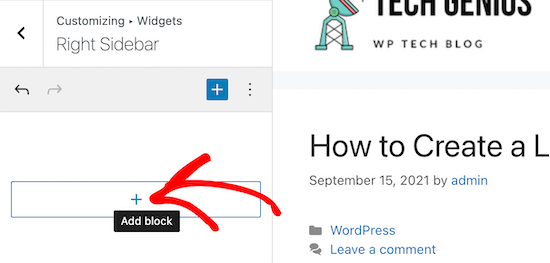
The process of adding a widget is the same as above.
Once you have finished making changes to your widget area, click the ‘Publish’ button to push your changes live.
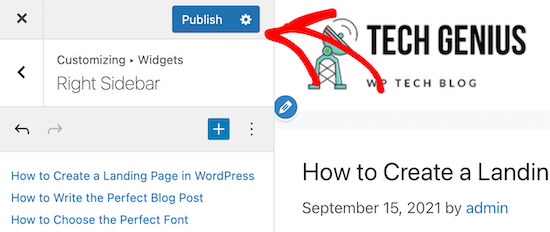
How to Remove a Widget in WordPress
Removing a widget in WordPress is as easy as the process of adding one. Simply navigate to Appearance » Widgets in your WordPress dashboard.
After that, click on the widget block that you want to delete.

Then, at the top of the widget block, click the three dots ‘Options’ button. This brings up a menu that lets you move and delete the widget.
To delete the widget, simply select the ‘Remove block’ option.
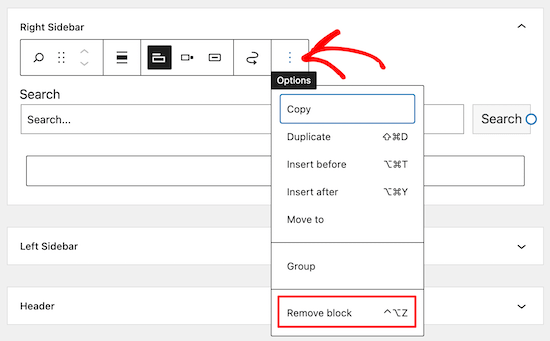
Deleting the widget will remove it from your sidebar and delete the widget settings or any options you selected.
Sometimes, you might want to remove a widget, but save the settings and changes you have made for the future.
To do this, click the ‘Drag’ icon at the top of the widget.
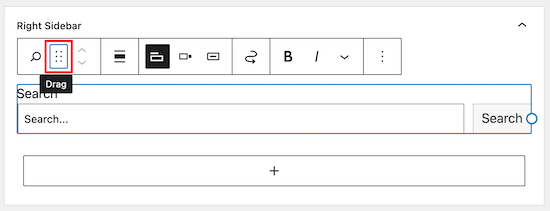
Then, drag the widget to the ‘Inactive widgets’ section.
Before you exit the page, make sure to click the ‘Update’ button to save your widget settings.
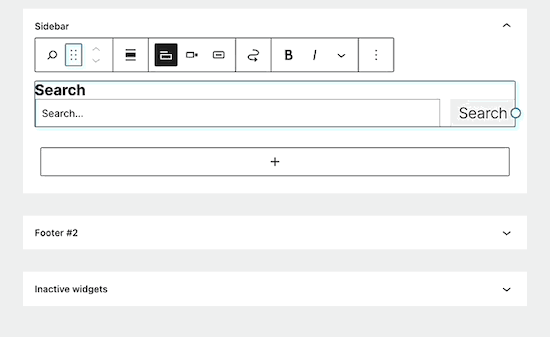
If you want to use that widget again, then simply drag the widget block from the ‘Inactive widgets’ section to an active widget section.
You may also want to see our guide on how to disable unwanted widgets from WordPress.
What Kinds of Widgets Are Available for WordPress?
A default WordPress installation comes with built-in widgets, including recent posts, tags, a search bar, categories, a calendar, and more.

However, most WordPress plugins and themes also come with their own widget blocks that you can add to your site.
For example, the WPForms plugin can be used to create contact form pages, but it also has a widget that lets you add forms to any widget-ready area of your site.

Similarly, many other themes and plugins add widgets, so their users can add things to their WordPress widget areas without writing any code or HTML.
You can even create your own widget to add a completely custom widget to WordPress. For more details, see our guide on how to create a custom WordPress widget.
We hope this article helped you learn how to add and use widgets in WordPress. You may also want to see our guide on how to choose the best blogging platform and our picks for the best business phone services for small business.
If you liked this article, then please subscribe to our YouTube Channel for WordPress video tutorials. You can also find us on Twitter and Facebook.

